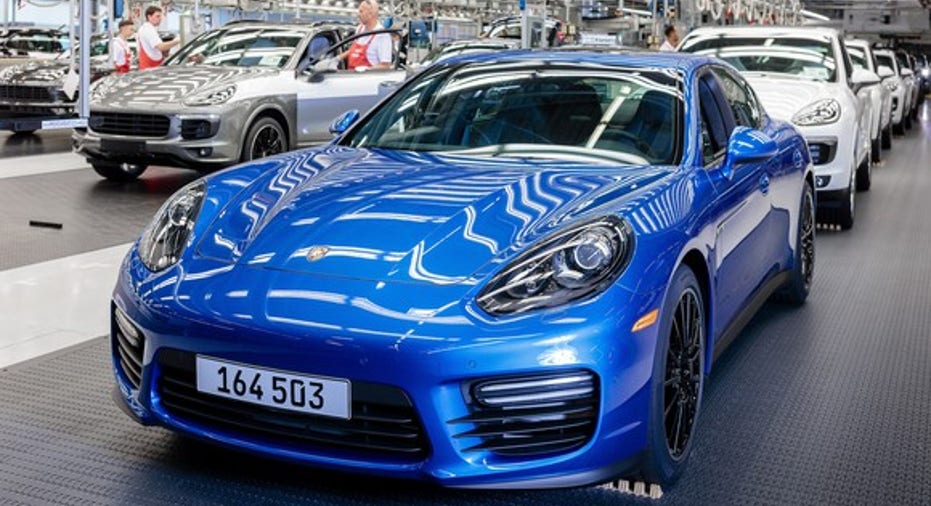New Trouble for Volkswagen: Did Porsche Cheat on Fuel-Economy Tests?

German government regulators are examining whether Volkswagen AG's (NASDAQOTH: VLKAY) subsidiary Porsche programmed its vehicles to cheat on government tests of fuel economy and carbon-dioxide emissions, according to reports in the German business press.
The news follows reports last month that the U.S. Environmental Protection Agency and California regulators had opened investigations into similar allegations involving VW luxury-car subsidiary Audi.
If these investigations pan out, they could open a new dimension to Volkswagen's ongoing diesel-emissions cheating scandal, one that doesn't necessarily involve diesels but could implicate VW's most important profit generators in cheating on tests that are of concern to governments all over the world.
Porsche's factory in Leipzig, Germany. Image source: Dr. Ing. h.c. F. Porsche AG.
Why German regulators are investigating Porsche
According to a report in German business magazine WirtschaftsWoche on Thursday, Germany's Federal Ministry of Transport and its Motor Transport Authority (known by its initials in German, "KBA") are investigating whether Porsche equipped its vehicles with software that can detect when a government test is under way.
The concern is that the Porsches may have been programmed to switch to a mode in which less fuel is consumed and less carbon dioxide is emitted when testing is detected. Carbon dioxide emissions are implicated in global warming and are strictly regulated in the European Union (and elsewhere).
WirtschaftsWoche has reported that Porsche insiders tipped off the government to the existence of the software.
Why this could be another huge mess for VW
VW's admission that its diesel-powered vehicles cheated on emissions tests was (and is) a big deal in the United States and some other countries but less so in Europe. The emissions in question with the diesel engines are oxides of nitrogen, which contribute to smog.
Oxides of nitrogen are heavy regulated in the United States under the Clean Air Act (and extra-heavily regulated in smog-prone California), but European regulators have been less concerned with them. That's why the U.S. government's actions against VW over the diesel-emissions scandal have been much more draconian than Europe's and why California regulators have played such a large role in the efforts against VW.
Those European regulators are very concerned about carbon dioxide, however. Carbon dioxide emissions are correlated with the amount of fuel burned by an engine; a vehicle that gets better fuel economy will emit less carbon dioxide.
Because fuel-economy testing is a big deal in Europe (and therefore in Germany), VW is more likely to face harsh penalties in its home region if the cheating allegations are proven. It's also likely to be hit with a whole new round of penalties in the U.S. and other jurisdictions (like South Korea) that have already come down hard on VW for the diesel cheating.
There's another dimension, too: While the diesel emissions issue might seem a bit esoteric to the average car shopper, cheating on fuel-economy tests isn't. If the allegations pan out, the Audi and Porsche brands could be seriously damaged as green-minded customers look elsewhere.
The concern for investors: This targets VW's most important profit centers
While there were a few Audi and Porsche models equipped with the diesel-emissions cheating scandal, the vast majority of the vehicles involved were VWs. The scandal appears to have damaged the VW brand in many parts of the world, but the Audi and Porsche brands appear not to have been affected by what has been seen as a "VW" scandal.
That's important, because while Audi and Porsche together account for less than 20% of the passenger vehicles sold by VW around the world, the brands generated 67% of its operating profit in 2015. If the two brands suffered damage that hurt their sales or pricing power, the effect on VW's bottom line would be dramatic.
That's the potential here. Stay tuned.
10 stocks we like better than Volkswagen When investing geniuses David and Tom Gardner have a stock tip, it can pay to listen. After all, the newsletter they have run for over a decade, Motley Fool Stock Advisor, has tripled the market.*
David and Tom just revealed what they believe are the 10 best stocks for investors to buy right now... and Volkswagen AG (ADR) wasn't one of them! That's right -- they think these 10 stocks are even better buys.
Click here to learn about these picks!
*Stock Advisor returns as of Nov. 7, 2016
John Rosevear has no position in any stocks mentioned. The Motley Fool has no position in any of the stocks mentioned. Try any of our Foolish newsletter services free for 30 days. We Fools may not all hold the same opinions, but we all believe that considering a diverse range of insights makes us better investors. The Motley Fool has a disclosure policy.



















